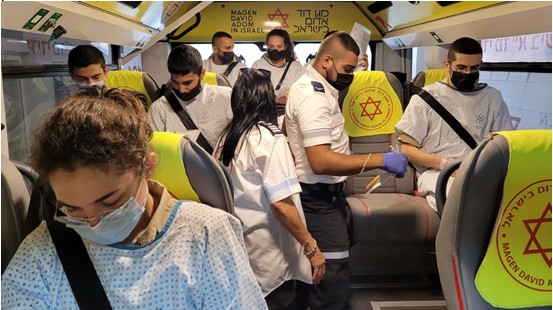Due to a veto from the Joint List, the Knesset did not vote on Monday on the government’s decision to enable the Shin Bet (Israel Security Agency) to track people exposed to the COVID-19 Omicron variant. Announcing the measure on Saturday, Prime Minister Naftali Bennett said the phone tracking would be used to locate carriers of the new and potentially more contagious variant in order to curb its transmission to others.
The government passed the decision on Sunday with the approval of the Meretz leader, Health Minister Nitzan Horowitz, who vigorously opposed such surveillance when enacted by the previous government. However, the measure requires Knesset approval. The heads of far-right four opposition factions wrote a letter to the Ministerial Liaison to the Knesset Ze’ev Elkin volunteering to cancel its no-confidence motions and bring the surveillance plan to an immediate vote.

The COVID-19 vaccination campaign among young people (Photo: Magen David Adom)
The Joint List strongly opposes Shin Bet surveillance, fearing it sets a precedent for use on issues other than the coronavirus. The party did not approve adding the item to the Knesset’s agenda. By contrast, Islamic Ra’am party head Mansour Abbas told Hebrew University’s Truman institute that he supports Shin-Bet surveillance to stop the spread of variants.
On Monday, human rights groups petitioned Israel’s top court to repeal new measure that authorize the country’s domestic intelligence service to use counter-terrorism phone tracking technology to contain the spread of the Omicron virus variant. Israeli rights groups say the emergency measures violate previous Supreme Court rulings over such surveillance, used on-and-off by the country’s Shin Bet domestic intelligence agency since March 2020.
“Operation of the Secret Service to trace citizens violates the basic trust between the citizen and the government,” the Association for Civil Rights in Israel (ACRI), one of four groups who petitioned the court, said in a statement.
The surveillance technology matches virus carriers’ locations against other mobile phones nearby to determine with whom they have come into contact. Israel’s Supreme Court limited the scope of its use this year, after civil rights groups mounted challenges over privacy concerns.
Related:


